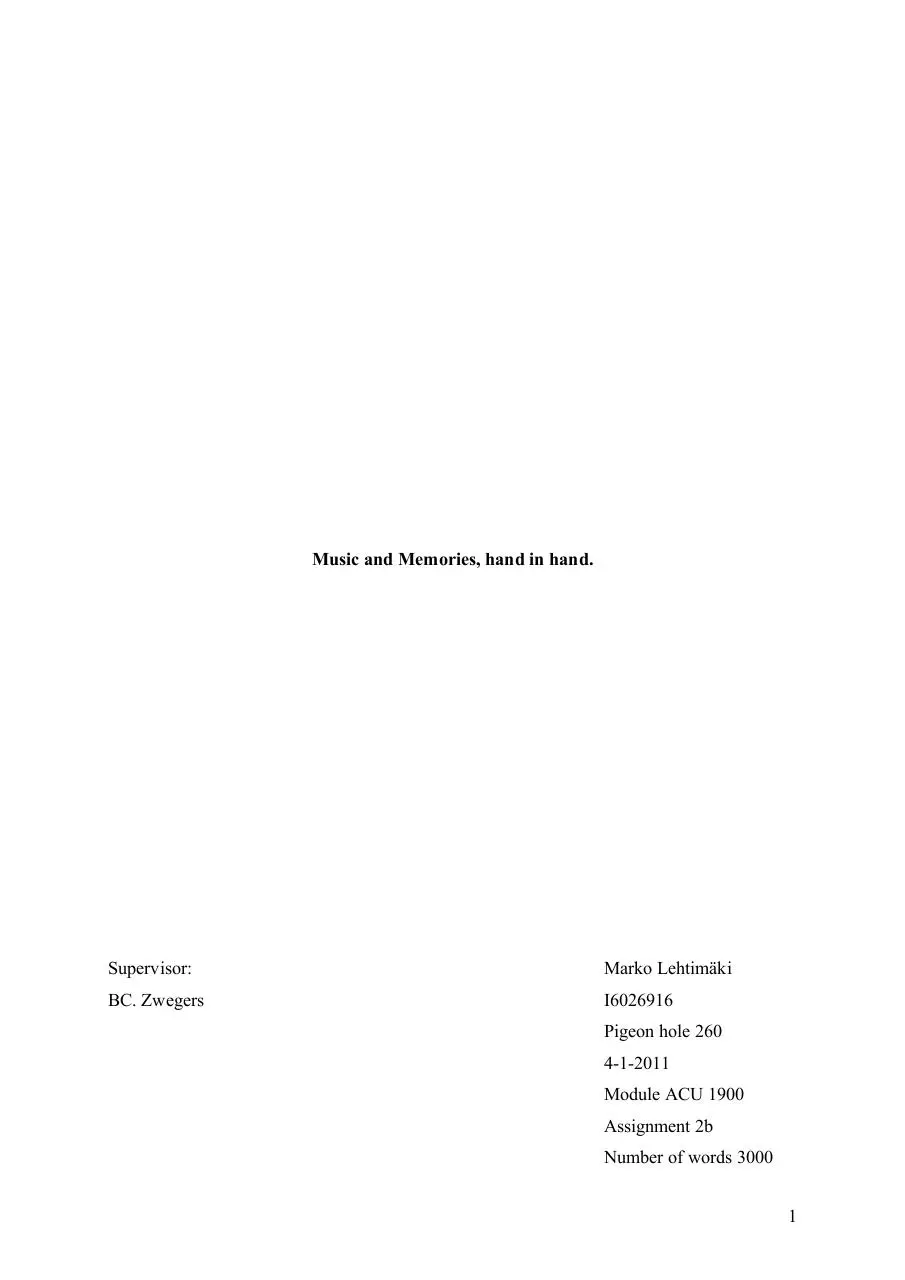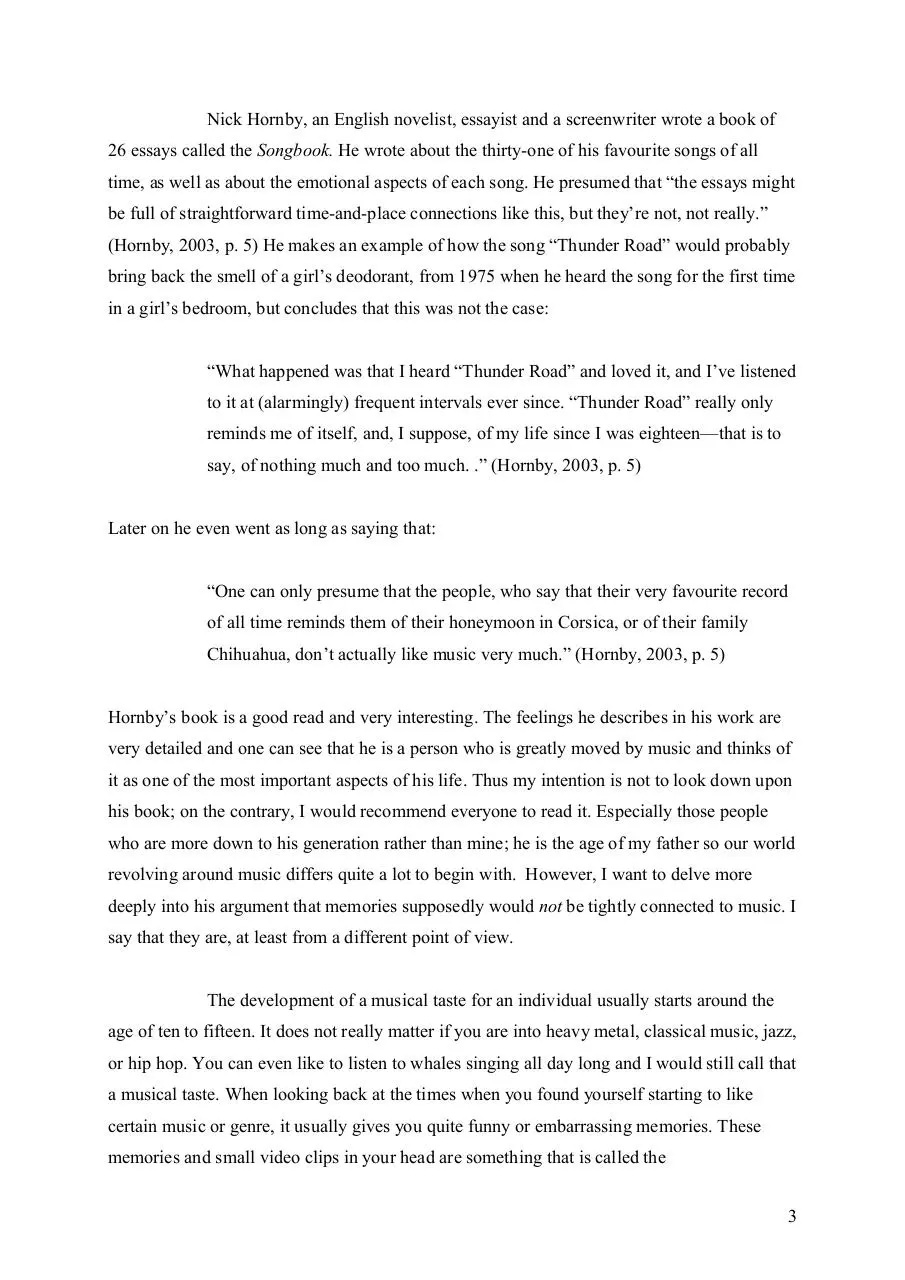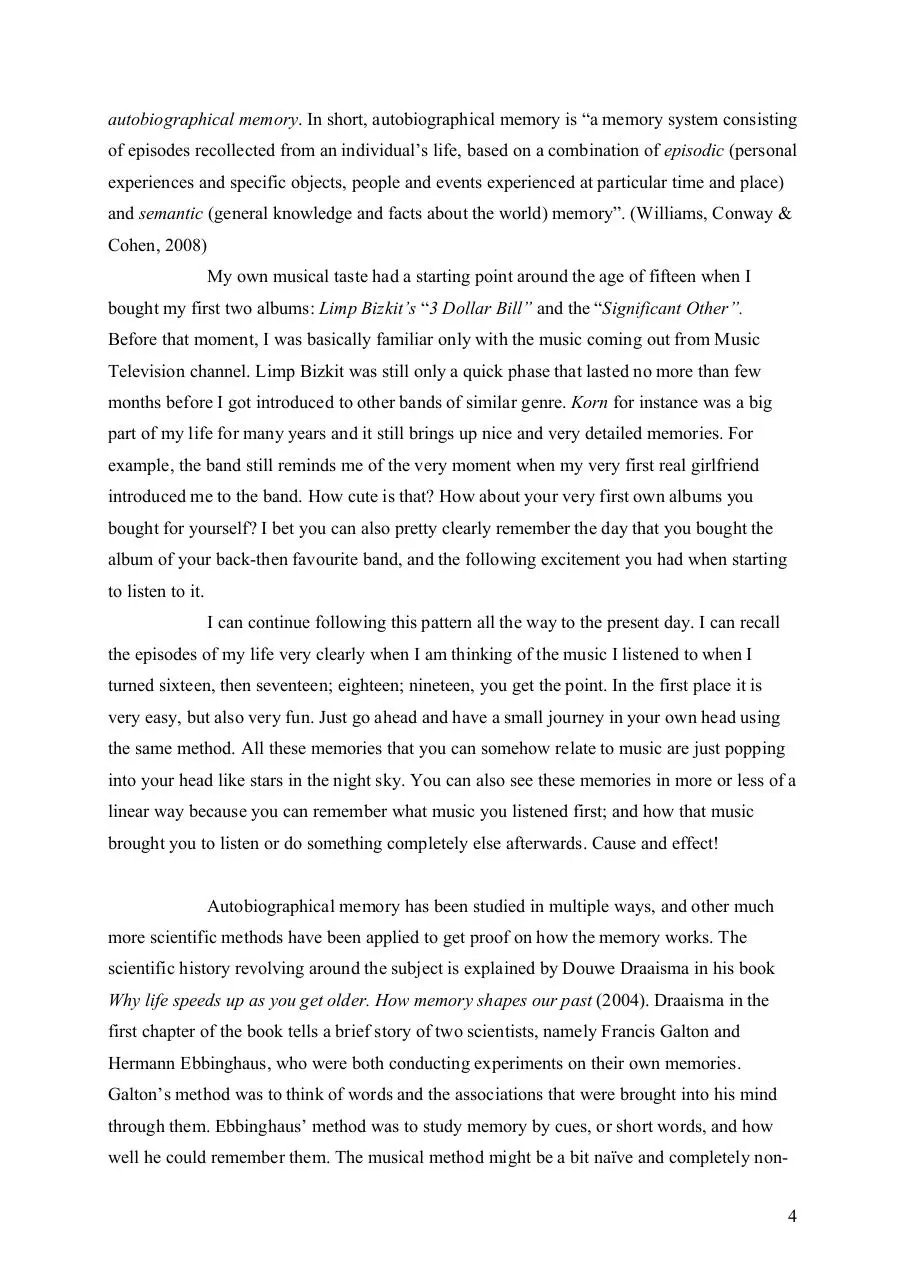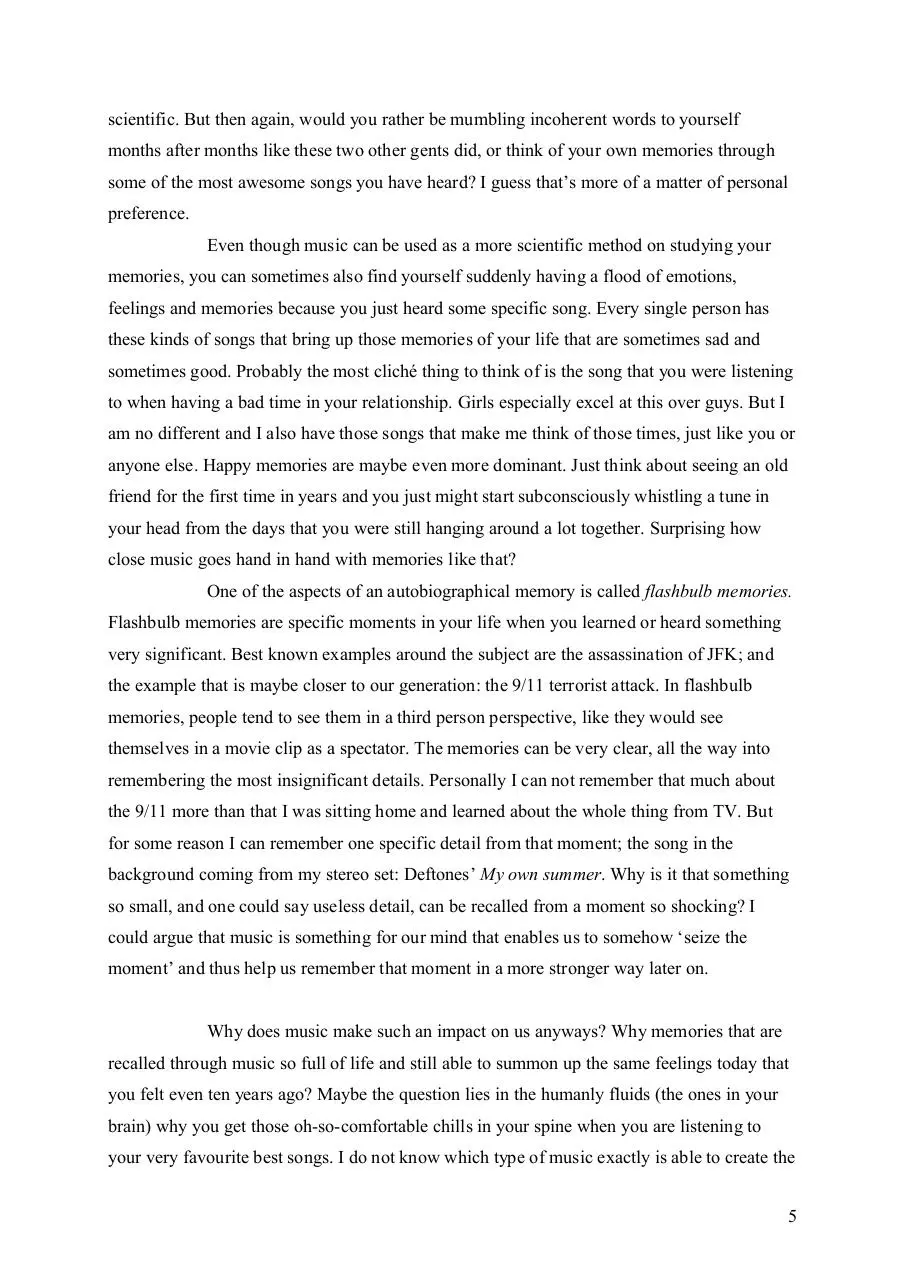MusicAndMemories (PDF)
File information
Author: Marko
This PDF 1.4 document has been generated by Writer / OpenOffice.org 3.1, and has been sent on pdf-archive.com on 29/03/2011 at 22:52, from IP address 84.30.x.x.
The current document download page has been viewed 1304 times.
File size: 99.12 KB (9 pages).
Privacy: public file





File preview
Music and Memories, hand in hand.
Supervisor:
Marko Lehtimäki
BC. Zwegers
I6026916
Pigeon hole 260
4-1-2011
Module ACU 1900
Assignment 2b
Number of words 3000
1
Everyone has a musical taste of their own and I don’t believe I have ever met a
person who would not like to listen to at least some kind of music. There are probably as
many musical tastes in the world as there are people living on the surface of it. Usually people
like to stick around to some sort of genre, or at least have some diversity in the music they
like to listen to. Whichever it is, music can be one of the most influential ways to look back at
your life and use either the music itself, or the development of musical taste as a guideline to
recall the memories from the episodes throughout your life.
With some exceptions of course, one could argue that everyone develops their
musical taste around their teenage years and often go along with that sort of music for the rest
of their life. Thinking about the time when you got the first album of your favourite band
already conjures up certain memories of that specific moment, but you can also use that
moment as a starting point to think of what else you were doing back then. That is more of a
specific method of using the tool, but it can also be used by accident. Sometimes you hear a
song from the past that reminds you of a certain moment. Maybe it is a sad moment, like
when you were going through a hard break-up with your girl or a boyfriend. Or a happy
moment, like when you were having the best time of your life during that one summer party,
while you were hanging out with your friends and everyone was having way too much fun for
it to be actually legal in the first place.
But how do you see yourself back then, when thinking about it now? Is life
better today than when you were younger? Are the feelings and emotions derived from those
times still as vivid and strong now, as they were when actually going through the moment
itself? And why is it exactly that music has such a strong impact on the feelings anyways? Is
it some mysterious force, or is there more into it? A good musical definition that can be used
to explain those memories is “evergreen music”, more specifically the songs that you never
get tired of listening to. Every generation has evergreen songs of their times that can be used
to remember things about when they were younger. Maybe today you can see yourself when
you were thirteen years old and laugh about how clueless life was back then. But what do you
think your parents feel when they see a picture in their head of themselves when they were the
same age as you are now?
2
Nick Hornby, an English novelist, essayist and a screenwriter wrote a book of
26 essays called the Songbook. He wrote about the thirty-one of his favourite songs of all
time, as well as about the emotional aspects of each song. He presumed that “the essays might
be full of straightforward time-and-place connections like this, but they’re not, not really.”
(Hornby, 2003, p. 5) He makes an example of how the song “Thunder Road” would probably
bring back the smell of a girl’s deodorant, from 1975 when he heard the song for the first time
in a girl’s bedroom, but concludes that this was not the case:
“What happened was that I heard “Thunder Road” and loved it, and I’ve listened
to it at (alarmingly) frequent intervals ever since. “Thunder Road” really only
reminds me of itself, and, I suppose, of my life since I was eighteen—that is to
say, of nothing much and too much. .” (Hornby, 2003, p. 5)
Later on he even went as long as saying that:
“One can only presume that the people, who say that their very favourite record
of all time reminds them of their honeymoon in Corsica, or of their family
Chihuahua, don’t actually like music very much.” (Hornby, 2003, p. 5)
Hornby’s book is a good read and very interesting. The feelings he describes in his work are
very detailed and one can see that he is a person who is greatly moved by music and thinks of
it as one of the most important aspects of his life. Thus my intention is not to look down upon
his book; on the contrary, I would recommend everyone to read it. Especially those people
who are more down to his generation rather than mine; he is the age of my father so our world
revolving around music differs quite a lot to begin with. However, I want to delve more
deeply into his argument that memories supposedly would not be tightly connected to music. I
say that they are, at least from a different point of view.
The development of a musical taste for an individual usually starts around the
age of ten to fifteen. It does not really matter if you are into heavy metal, classical music, jazz,
or hip hop. You can even like to listen to whales singing all day long and I would still call that
a musical taste. When looking back at the times when you found yourself starting to like
certain music or genre, it usually gives you quite funny or embarrassing memories. These
memories and small video clips in your head are something that is called the
3
autobiographical memory. In short, autobiographical memory is “a memory system consisting
of episodes recollected from an individual’s life, based on a combination of episodic (personal
experiences and specific objects, people and events experienced at particular time and place)
and semantic (general knowledge and facts about the world) memory”. (Williams, Conway &
Cohen, 2008)
My own musical taste had a starting point around the age of fifteen when I
bought my first two albums: Limp Bizkit’s “3 Dollar Bill” and the “Significant Other”.
Before that moment, I was basically familiar only with the music coming out from Music
Television channel. Limp Bizkit was still only a quick phase that lasted no more than few
months before I got introduced to other bands of similar genre. Korn for instance was a big
part of my life for many years and it still brings up nice and very detailed memories. For
example, the band still reminds me of the very moment when my very first real girlfriend
introduced me to the band. How cute is that? How about your very first own albums you
bought for yourself? I bet you can also pretty clearly remember the day that you bought the
album of your back-then favourite band, and the following excitement you had when starting
to listen to it.
I can continue following this pattern all the way to the present day. I can recall
the episodes of my life very clearly when I am thinking of the music I listened to when I
turned sixteen, then seventeen; eighteen; nineteen, you get the point. In the first place it is
very easy, but also very fun. Just go ahead and have a small journey in your own head using
the same method. All these memories that you can somehow relate to music are just popping
into your head like stars in the night sky. You can also see these memories in more or less of a
linear way because you can remember what music you listened first; and how that music
brought you to listen or do something completely else afterwards. Cause and effect!
Autobiographical memory has been studied in multiple ways, and other much
more scientific methods have been applied to get proof on how the memory works. The
scientific history revolving around the subject is explained by Douwe Draaisma in his book
Why life speeds up as you get older. How memory shapes our past (2004). Draaisma in the
first chapter of the book tells a brief story of two scientists, namely Francis Galton and
Hermann Ebbinghaus, who were both conducting experiments on their own memories.
Galton’s method was to think of words and the associations that were brought into his mind
through them. Ebbinghaus’ method was to study memory by cues, or short words, and how
well he could remember them. The musical method might be a bit naïve and completely non4
scientific. But then again, would you rather be mumbling incoherent words to yourself
months after months like these two other gents did, or think of your own memories through
some of the most awesome songs you have heard? I guess that’s more of a matter of personal
preference.
Even though music can be used as a more scientific method on studying your
memories, you can sometimes also find yourself suddenly having a flood of emotions,
feelings and memories because you just heard some specific song. Every single person has
these kinds of songs that bring up those memories of your life that are sometimes sad and
sometimes good. Probably the most cliché thing to think of is the song that you were listening
to when having a bad time in your relationship. Girls especially excel at this over guys. But I
am no different and I also have those songs that make me think of those times, just like you or
anyone else. Happy memories are maybe even more dominant. Just think about seeing an old
friend for the first time in years and you just might start subconsciously whistling a tune in
your head from the days that you were still hanging around a lot together. Surprising how
close music goes hand in hand with memories like that?
One of the aspects of an autobiographical memory is called flashbulb memories.
Flashbulb memories are specific moments in your life when you learned or heard something
very significant. Best known examples around the subject are the assassination of JFK; and
the example that is maybe closer to our generation: the 9/11 terrorist attack. In flashbulb
memories, people tend to see them in a third person perspective, like they would see
themselves in a movie clip as a spectator. The memories can be very clear, all the way into
remembering the most insignificant details. Personally I can not remember that much about
the 9/11 more than that I was sitting home and learned about the whole thing from TV. But
for some reason I can remember one specific detail from that moment; the song in the
background coming from my stereo set: Deftones’ My own summer. Why is it that something
so small, and one could say useless detail, can be recalled from a moment so shocking? I
could argue that music is something for our mind that enables us to somehow ‘seize the
moment’ and thus help us remember that moment in a more stronger way later on.
Why does music make such an impact on us anyways? Why memories that are
recalled through music so full of life and still able to summon up the same feelings today that
you felt even ten years ago? Maybe the question lies in the humanly fluids (the ones in your
brain) why you get those oh-so-comfortable chills in your spine when you are listening to
your very favourite best songs. I do not know which type of music exactly is able to create the
5
chill-effect; or if the genre even matters; but personally I just love the feeling of listening to a
new song for the first time and getting that feeling into my back straight away. And I have
always wondered why that is like that?
The answer to that question might be more scientific that one would have guessed. A
Canadian research team found clear evidence that when a person is listening to one’s
favourite music, the brain releases an overload of a fluid called dopamine, which is also the
result of sexual arousal, or doing drugs. According to the researchers, the results were
surprising because until now dopamine had only been linked to human survival instincts. In
the first test the eight volunteers had to listen to their favourite music for fifteen minutes and
after that they were injected with a radio-active substance that would bind to the same
receptors in one’s brain as dopamine would. After that the volunteers were put into a PET
scanner. If there would be any dopamine in the brain that was released by listening to music,
the areas covered with dopamine would be shown as islands, or empty spots, in a sea of radioactive substance. This is exactly what happened. In the second test they went through the
same routine, but this time with random music. The test resulted into no dopamine at all. The
test subjects also pushed a button at the same moment when they got the shivers, and based on
that the researchers were able to combine them reliably to a flood of dopamine in the brain.
Most of the test subjects were close friends to classical music, but one was more into jazz and
another into rock music. (Salimpoor, V.N., Benovoy, M., Larcher, K., Alain Dagher, A.,
Zatorre, R.J. Anatomically distinct dopamine release during anticipation and experience of
peak emotion to music.)
So now there might be a scientific explanation to the feelings and shivers in
one’s body, coming from music. But how about the feelings today, when thinking about some
episode in your life that is very memorable to you? I always remember myself with some
embarrassment when thinking about myself when I was listening to certain music from the
days when I was around sixteen to seventeen. It definitely has everything to do with the style
of clothing for people of that age around the late 90’s and early 2000. But the funniest detail
from those times still was the available technology back then. Present day’s kids have it easy.
Now they have their iPod Minis, mp3 players, USB-sticks and all that. Even cell-phones can
be used as music devices today. If I wanted to carry music with me back in the 90’s, I had to
bring along a huge portable CD player called the’ WalkMan’. The thing could not really even
fit into any sort of a pocket at all, hence the name I guess, because it was the size of a fully
6
grown man when compared to your smallest music device today. The point being, it does not
matter if it was the technology you are laughing at, or yourself, or any reason. I do not know
about you but at least I get these kinds of funny memories in my mind that are somewhat
awkward, but that also draw a kind hearted smile on my face. What do you feel when thinking
about yourself ten years ago? Or what do you think your parents think of themselves today,
while trying to remember how they were like thirty years ago?
Evergreen music can be one of the best ways of thinking back to your life. Just
think about the song or a band you for some reason never get tired to. These songs usually
give you the strongest feelings, be it memories of very specific moments or a bit broader
episodes in your life. Personally I never get tired of the two first albums of Mudvayne. I can
always listen to them and it does not even matter which mood I am on. If I am feeling like
partying, these guys have songs for that; if I am in a bad mood and feeling like banging my
head to the wall to the point I lose my consciousness, these guys have songs for that also. And
I have so many memories related to this specific band that it would take me a whole book to
write all about it, just as Nick Hornby did for his thirty-one favourite songs; in a way at least.
Every generation has, or will have, their universal evergreen music eventually. I
do not think my generation has yet developed its own the same way your parents could argue
some music from their youth being today’s evergreen music. But it seems that even today
these songs that they were listening to still build up memories and feelings from those times.
Since I was wondering how the subject really reflects to an older generation than mine, I was
compelled to go and ask. And who would be a better target for my research than my own
parents. My mother, for example, remembers ABBA as one of her hot favourites which most
likely is not a surprise for anyone, not for us or her generation for that matter. I’d guess your
parents would possibly say the same. She also mentioned how the feelings 25-30 years later
are not that strong anymore, but still gets the same shivers from certain songs. Other funny
example was when she found herself thinking how certain songs from one moment can relate
to many other moments. For example Albenino’s Adaggio reminds her not only about her
wedding, but also of many funerals; and it was even the song that was played in the
background in an Olympic Figure Skating competition for the winning gold medallists.
Personally I can’t help but laugh at that recollection, but I can not help myself wondering
what Nick Hornby’s reaction would be.
7
Today my taste in music is very different than it was ten years ago, but at the
same time I can clearly see the path that led me to listen to the music of today. Following that
road brings up all kinds of memories, so clear that I could almost remember them just like it
happened yesterday. The feelings, or the memories of those feelings, are still very strong. It is
amazing how I still can remember the misery, or happiness, of some moments in my life so
clearly and how I can still remember the songs I listened to when I was partying with my
friends, still completely clueless about life. Or when I was crying a river because of
relationship issues; or the influence a certain band had in my taste in music that some friend
of my introduced me to; or how laughable of a person I see myself being when thinking of the
times ten years ago. The autobiographical memory is something to thank for that. Without it
we would not be able to re-live those episodes in our minds so clearly that it is like watching a
trailer of a movie. Following the path in your memory is also an epic journey that everyone
takes once in a while without even fully knowing it. I think all of us do it once or twice a year;
having these evenings when you go back into your albums in a hope to feel those chills in
your back that derive from the sheer awesomeness of nostalgia. Speaking of nostalgia and
movie trailers, I think I am going to put on some Mudvayne now and recommend you do the
same with your favourite teenager band: be it the Spice Girls, Dimmu Borgir, ABBA, Tupac
Shakur, Bruce Springsteen, or whatever you liked to listen to ’back in the good old days’.
8
References:
Draaisma, D. (2004) Why life speeds up as you get older. How memory shapes our past.
Cambridge: Cambridge University Press
Hornby, N. (2003) Songbook. New York. Riverhead Books: The Berkley Publishing Group
Salimpoor, V.N., Benovoy, M., Larcher, K., Alain Dagher, A., Zatorre, R.J.
Anatomically distinct dopamine release during anticipation and experience of peak emotion
to music. Retrieved 09 January, 2011, from
http://www.nature.com/neuro/journal/vaop/ncurrent/full/nn.2726.html#/
Williams, H. L., Conway, M. A., & Cohen, G. (2008). Autobiographical memory. In G.
Cohen & M. A. Conway (Eds.), Memory in the Real World (3rd ed). Hove, UK: Psychology
Press.
9
Download MusicAndMemories
MusicAndMemories.pdf (PDF, 99.12 KB)
Download PDF
Share this file on social networks
Link to this page
Permanent link
Use the permanent link to the download page to share your document on Facebook, Twitter, LinkedIn, or directly with a contact by e-Mail, Messenger, Whatsapp, Line..
Short link
Use the short link to share your document on Twitter or by text message (SMS)
HTML Code
Copy the following HTML code to share your document on a Website or Blog
QR Code to this page

This file has been shared publicly by a user of PDF Archive.
Document ID: 0000029609.